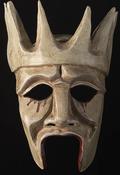| Book: Category: Title: Author: Date Completed: | 46 A Play Oedipus The King Sophocles [Ian Johnston, trans.] 09.07.2016 |
| I was browsing Audible recently, and discovered that for a very limited time the three Oedipus plays written by Sophocles were free to download. Naturally, I downloaded them immediately, and that night I listened to the first play of the trio, Oedipus The King. I knew a little about the Oedipus story going in. I knew that he was the son of a king, but had been sent away because of a prophecy that told how he was destined to kill his father and sleep with his mother. I knew that this then backfired, because having not been brought up in their company, Oedipus then did not recognise his parents when it came to killing or sleeping with them. And I knew that Sigmund Freud named his theory that suggests all men want to sleep with their mothers after Oedipus. (I'm sure there is more to Freud's theory than just that, but I'm a musician not a psychologist, so that's basically all I've picked up.) |
What I didn't know, and was interested to discover, was that all of the stuff I knew about Oedipus had actually already occurred before the events of the play happen. Oedipus is already king, having unknowingly murdered his dad and correctly guessed the riddle of the Sphinx. Thebes, the land Oedipus rules, is plagued by a blight from Apollo, who is angry at the murderer of the previous king. Unsurprisingly, Oedipus calls down all kinds of punishments on the murderer, unaware that it was, of course, himself who committed the regicide. It would be a bit mean to judge Sophocles for his clichéd storytelling just because so many writers who came after him used the same techniques (yes, I'm looking at you, Shakespeare), but I admit, as I listened, I did have to repeatedly remind myself of the fact that this stuff was new when it was being written and therefore the play wasn't as formulaic as I, a 21st-century listener, was experiencing it to be.
Most of the play is taken up with Oedipus getting angry at innocent people. He gets angry when the prophet, who he hired to reveal the murderer, accuses Oedipus of the crime. He gets angry at his wife's brother (i.e. his own uncle, because incest makes family relations complicated) for bringing the prophet to him, despite the fact that Oedipus had ordered him to do so. And then, when he finally finds out the truth, he gets so angry with himself that he stabs his own eyes out with his wife's/mother's brooches.
Basically, Oedipus is a very angry person, and that leads to something I found particularly unsettling. Sophocles obviously wanted to paint Oedipus as a hero and a great man at the beginning of the story. Oedipus had defeated the sphynx and lifted the curse on Thebes, and he makes a lot of good choices when he learns about Apollo's plague, calling for help before his advisors get the chance to tell him that's what he ought to do. But the play glosses over the fact that, even at the start, Oedipus is guilty of mass murder. Even although he didn't know one of the people he killed happened to be his biological father, he still deliberately killed five men who had made him angry one time. This is probably a clash of cultures between Ancient Greece and 21st-century Scotland, but even before the reveal, Oedipus isn't, and never has been, a good person. Sure, he gets upset once he realises one of the people he murdered was his father, but in all honesty he seems more put out by the fact that he happened to accidentally marry and have kids with his mother!
And, yes, incest is probably the ickier of the two, but it's certainly not the less moral, particularly seeing as Oedipus had no way to know that the woman he was marrying was his mother, whereas he had every reason to know that he was killing five men who had done barely anything to provoke him. (The reason Oedipus gives for committing mass murder, by the way, is that he refused to get out of the way of the king's carriage so one of the drivers used the horse's whip on him, which certainly wasn't the kindest move on the part of the whip user, but still didn't warrant murder.)
Anyway, finding his wife/mother has committed suicide on discovering the incest, Oedipus, blind and ashamed, begs to be banished from the kingdom, and requests that his uncle/brother-in-law take care of his daughters/sisters. His wish is granted, and the play bleakly ends.
All in all, it was a surprisingly enjoyable listen, given the grim subject matter. The Audible version was well performed with pretty music in between the scenes. I particularly liked the scenes with the gods, especially the point when they deferred to the wisdom of the party-god Dionysus, which I found very amusing. I liked the performance a lot. The story has clearly stood the test of time, and I'm glad to have read (well, listened to) it.

 RSS Feed
RSS Feed
